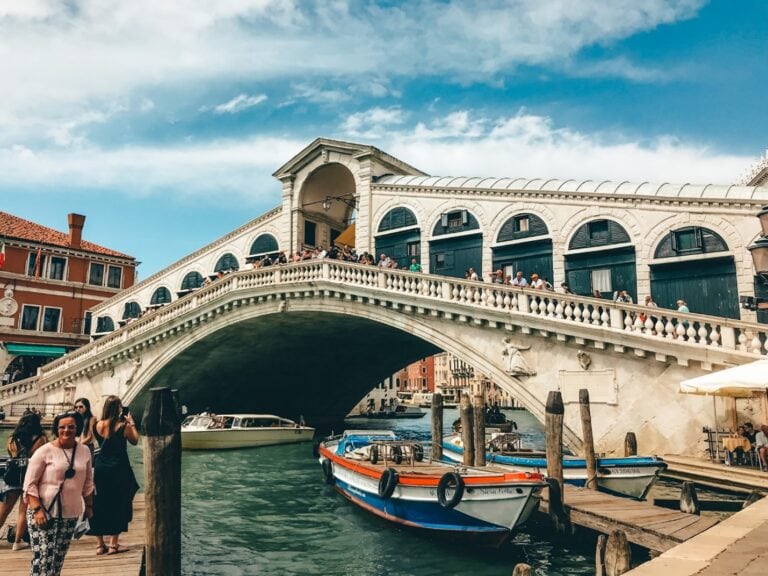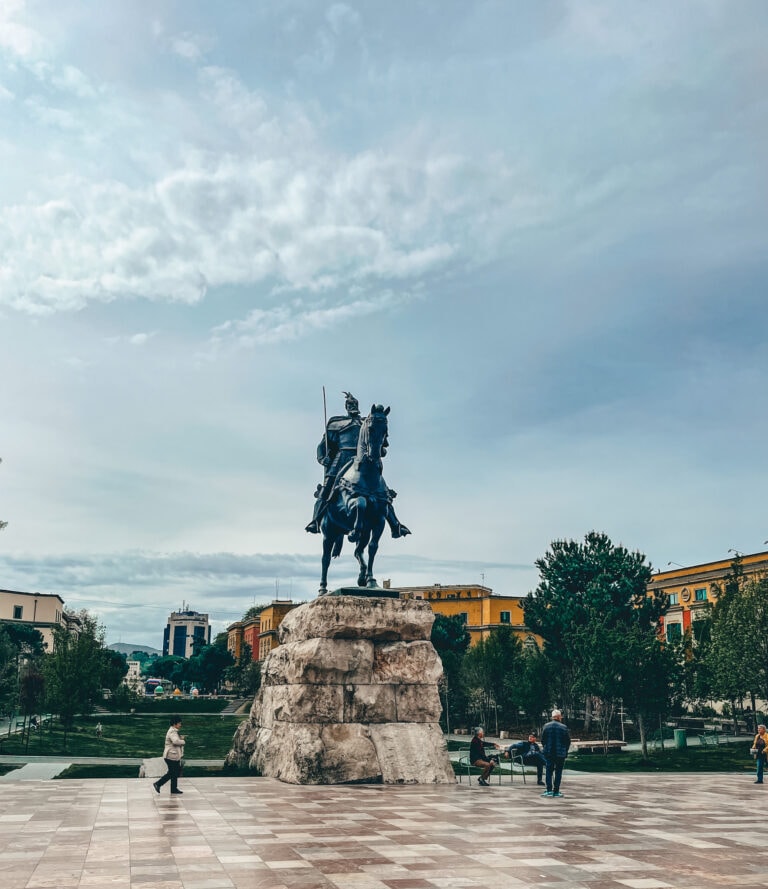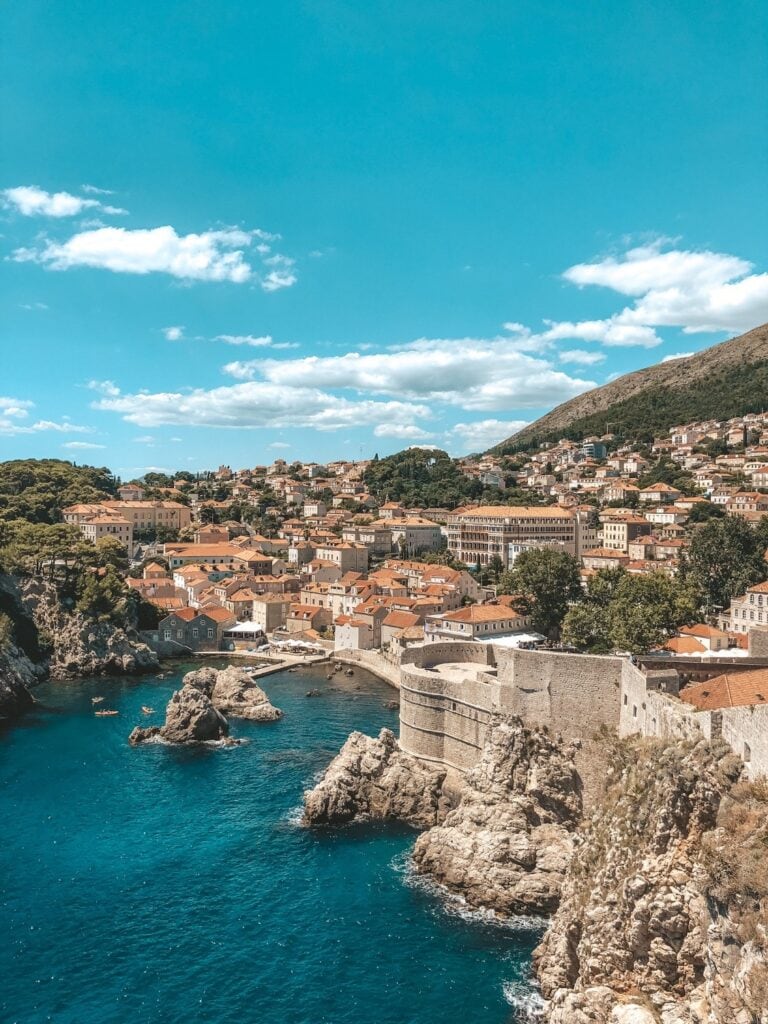The 18 Best Warm Places in March in Europe for Vacation
Looking for warm places in March in Europe? There are many great places to visit, but Spain is your best bet! It’s the warmest country around this time with lots of cool cities to check out.
But don’t stop there – places like Malta, the southern parts of Italy and France, and Portugal are also great picks for some March sunshine.
I’ve been to most of these spots myself, but I also reached out to some travel blogger friends for their recommendations to be sure this was the most accurate list possible.
They’ve shared their favorite places and tips to help you plan an awesome trip. So, if you’re ready to leave the cold behind and soak up some sun, keep reading for the 19 top warm weather spots in Europe for March.
Some links on this blog are affiliate links, meaning I may earn a commission at no extra cost to you if you make a purchase through them. All opinions are my own, and I only recommend products and services I personally use and believe in. Thanks for your support!
Where in Europe is hottest in March?
March is shoulder season in most of Europe, before the big summer rush of tourists. It’s a great time to get good deals on flights and accommodations, but weather can be colder compared to summer months.
However, if you’re craving a warm Europe trip in the early spring, it’s still very possible. Below are the warmest destinations in Europe in March.
Destination with the Hottest Average Temperature: Sevilla, Spain
Hottest Country in Europe in March: Spain
Top 3 Warmest Countries in Spring: Spain, Malta, Portugal
Below, is an even longer list of warm destinations with descriptions of what to do and tips for visiting. This list is organized in alphabetical order and grouped by country. All are great places to visit!
France
1. Nice
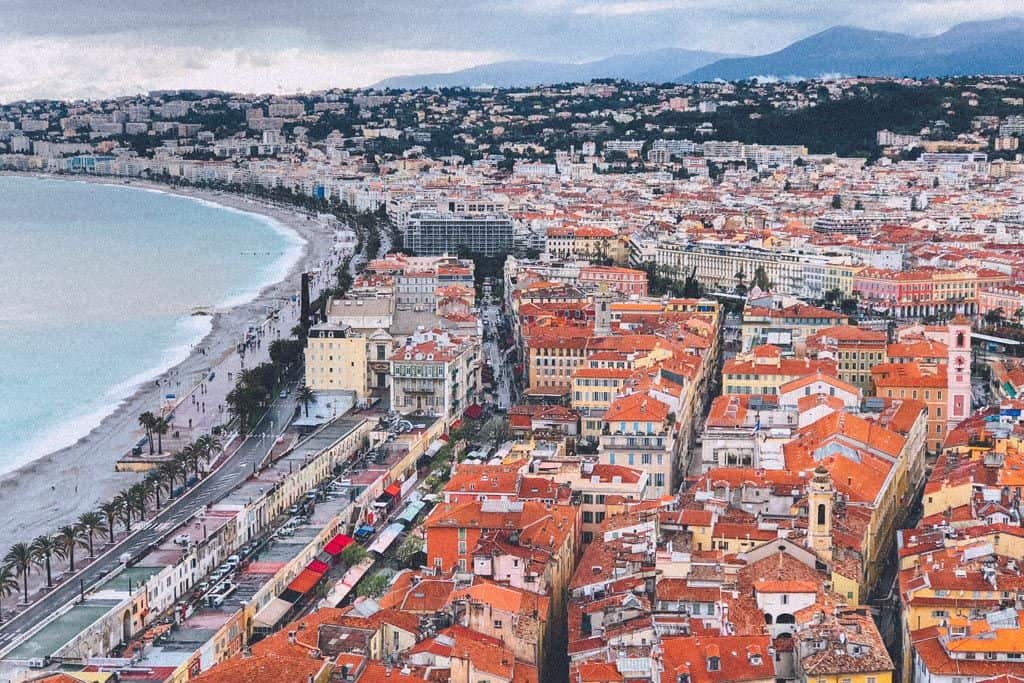
☀️ Average Temperature: 59/45 °F | ☔ Average Rainfall: 3 inches
Nice, in the French Riviera, is a great place to visit in Europe in March. One of the sunniest places in France, temperatures in Nice in March can reach 15C.
If you visit Nice in early March, you will enjoy the last days of Nice’s Carnival, one of France’s most famous carnivals. Come late March, and it will be pleasant enough to lay on the beach (but the water is still too cold for a bath).
In addition to sunbathing and eating delicious ice creams along the Promenade des Anglais (a must of Nice!), you can hike up to Castle Hill for one of the best city views over the Baie des Anges or take a leisurely walk around the picturesque Old Port.
In March, sunset in Nice is around 6.30 pm – 7.00 pm, and there are many trendy bars and terraces where you can enjoy a sunset apéritif with sea views. This is the French Riviera, after all!
Top Things To Do: Explore the Promenade des Anglais, Visit the Marc Chagall National Museum
Where to Stay: Hotel Negresco
Recommended by Elisa from France Bucket List
Greece
2. Athens
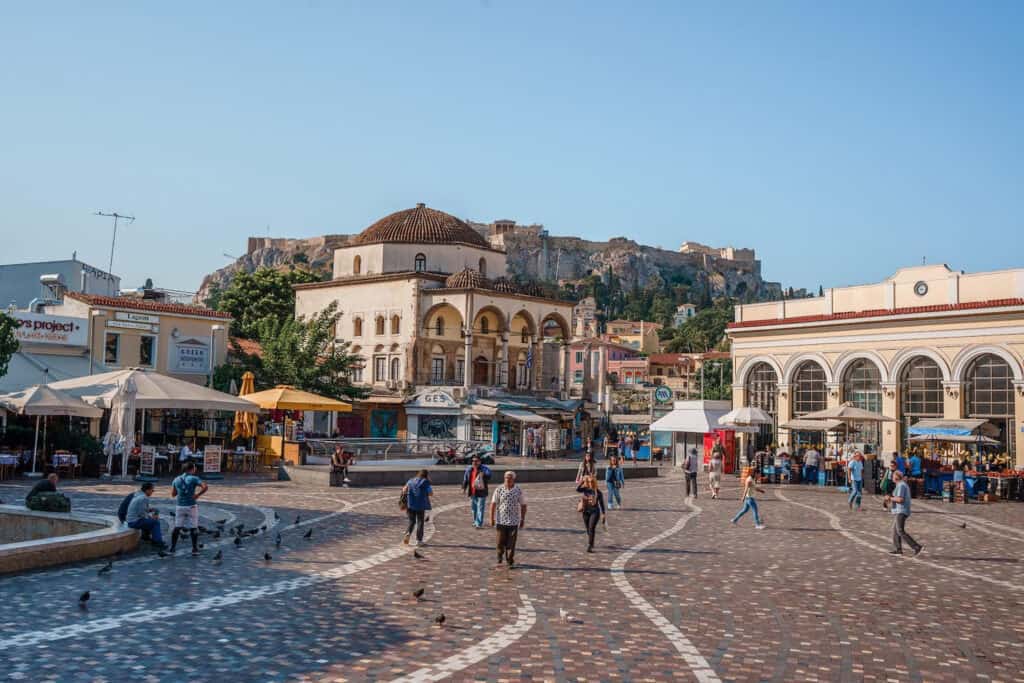
☀️ Average Temperature: 60/45 °F | ☔ Average Rainfall: 2 inches
March is a fantastic time to visit Athens! With the pleasant daytime temperatures averaging around 16 degrees Celsius and abundant sunshine during the day, it’s an ideal time to explore the Greek capital before the summer crowds arrive.
Stroll the Acropolis Hill without the hordes of tourists and enjoy other attractions, such as the Ancient Agora and Temple Of Zeus, at a leisurely pace.
It may not be obvious, but Athens is a foodie paradise, and we highly recommend taking a food tour to explore the best local eats such as pita gyros, loukoumades (sweet doughnuts), and various fish and meat meze.
Don’t also miss exploring the Monastiraki flea market and the hipster neighbourhood of Psiri, which is a great destination for nightlife enthusiasts.
On a sunny day, we suggest getting a rental car in Athens and making your way to the coast, which is only a 30-minute drive. Here, you’ll find some picturesque beaches and the spectacular Temple of Poseidon atop a 65-meter cliff.
On a bad weather day, you can always explore one of the Athen’s museusm such as the Acropolis Museum.
Top Things To Do: Visit the Acropolis, Explore the Plaka District
Where to Stay: Hotel Grande Bretagne
Recommended by Mal & Robin of Renting A Car In Europe 101
3. Cycladic Islands
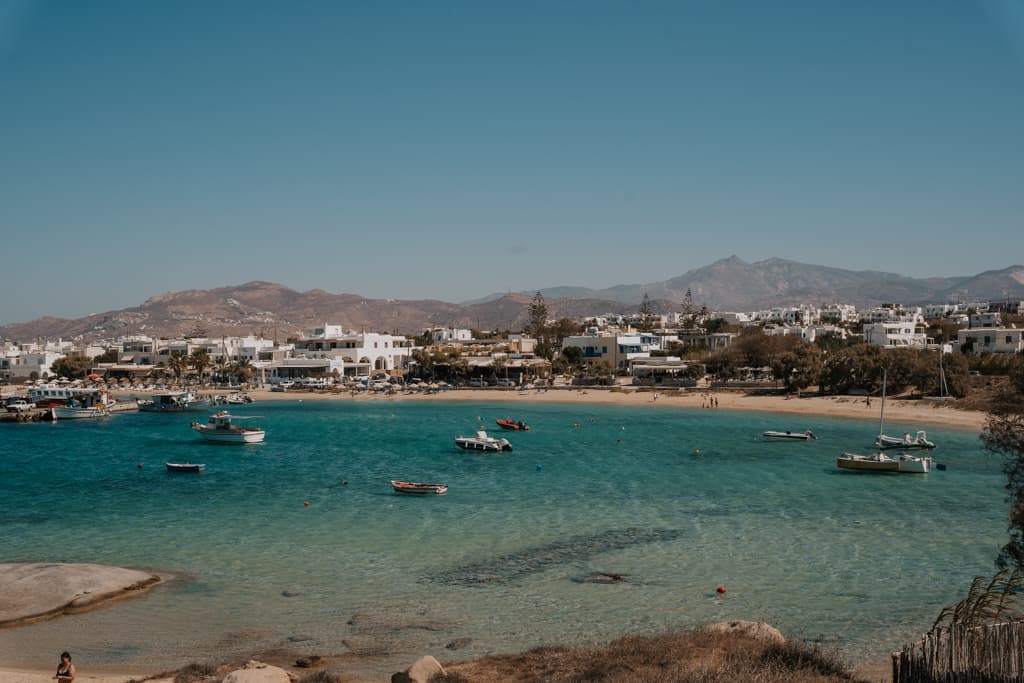
☀️ Average Temperature: 59/50 °F | ☔ Average Rainfall: 2 inches
The Cycladic Islands of Greece conjure images of sun-drenched beaches, azure seas, and quintessentially Greek white-washed architecture, and rightfully so.
Visiting at the end of March, you’re tapping into a sweet spot: where the Mediterranean charm is in full swing, minus the summer crowds.
In Milos, known for its otherworldly rock formations and lunar landscapes, the must-dos include a boat tour around its dramatic coastline to the Kleftiko Sea Cave and a visit to Sarakiniko Beach, with its moon-like surface and turquoise waters.
Paros, on the other hand, blends traditional Greek life with a chic, contemporary vibe. Stroll through the old town of Parikia, visit the historic Panagia Ekatontapiliani church, or unwind in the trendy cafes of Naoussa, one of the top places to stay on Paros.
The island’s windsurfing scene near Chrisi Akti on the eastern coast starts to pick up in March, offering a thrilling way to experience its crystal-clear waters.
Naxos, the largest in the Cyclades, is a blend of ancient ruins, lush valleys, and long sandy beaches like Agios Prokopios and Plaka Beaches. The Portara, a massive marble gateway in the capital of Naxos, is a sunset-watching spot like no other.
However, visiting in March has its trade-offs. The sea might still be a tad too chilly for swimming, and not all seasonal businesses are open yet.
Top Things To Do: Island hopping, Discover ancient ruins
Where to Stay: Mykonos Blu Grecotel Exclusive Resort
Recommended by Haley of Haley Blackall Travel
4. Kefalonia
☀️ Average Temperature: 57/48 °F | ☔ Average Rainfall: 3 inches
Top Things To Do: Visit Myrtos Beach, Explore Melissani Cave
Where to Stay: F Zeen Retreat
5. Santorini
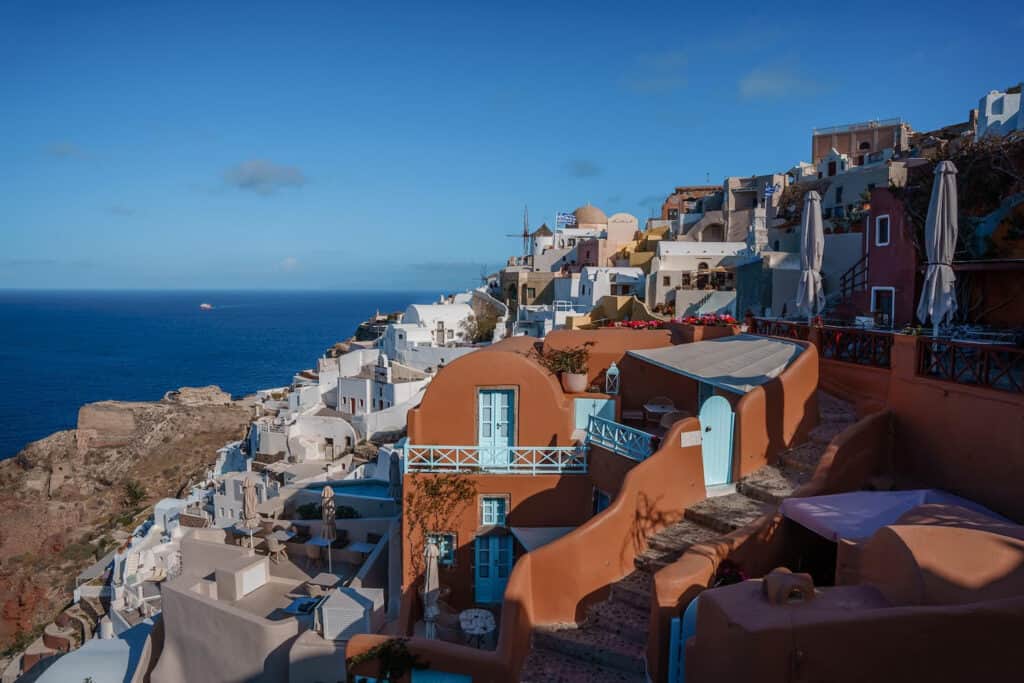
☀️ Average Temperature: 60/50 °F | ☔ Average Rainfall: 1.5 inches
Why visit Santorini in March? Well, if you ever dreamed about a romantic getaway to this iconic Greek island but didn’t have the budget to do it, the good news is that Santorini in the spring is so much cheaper!
Staying in one of the romantic private pool suites in Santorini is so much more affordable off-season. You can snatch a deal on one of these beauties, sometimes even at 50% off!
With day temperatures of 16 degrees Celcius and plenty of sunshine, you can also have an amazing time exploring the island. The number one activity to do on the island is a wine tour.
Santorini is famous for its long-rooted wine-making heritage, and sampling the local varieties of fermented grapes, such as the Assyrtiko, is a must-do.
Make sure you see at least one sunset in Oia, and the best place for it is Oia Castle. If you’re a history lover, there is also a small museum in Oia showcasing the island’s history, including its wine-making tradition.
Another great activity for early spring is hiking, and if you’re an outdoor enthusiast, you’ll be in for a treat. We recommend a hike from Fira to Oia, which takes you along the coast through gorgeous scenery.
The downsides of visiting Santorini in March are cold nights, which can make dining al fresco difficult and occasional rainy days.
Top Things To Do: Watch the sunset in Oia, Wine tasting tours
Where to Stay: Canaves Oia Hotel
Recommended by Mal & Robin of Raw Mal Roams
Italy
6. Cinque Terre
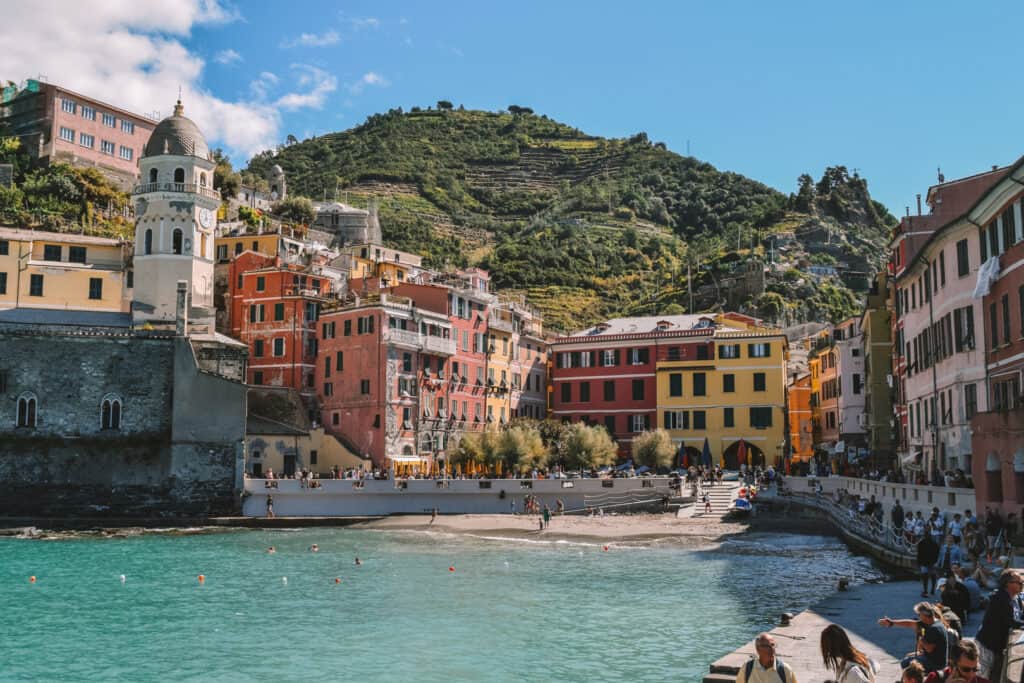
☀️ Average Temperature: 60/47 °F | ☔ Average Rainfall: 4 inches
The iconic Cinque Terre towns are a must-visit destination. With their rolling hills, famous colourful village clusters and turquoise waters, not to mention incredible cuisine, it’s easy to see why thousands of tourists flock to the UNESCO World Heritage site year after year.
There are five beautiful hillside villages including Monterosso, Vernazza, Corniglia, Manarola, and Riomaggiore each connected by hiking trails.
The growing popularity of Cinque Terre means that during peak summer the towns can become crowded. The hikes between the towns can become crowded and hard to navigate, restaurants are always full and finding a spot to watch the sunset is nearly impossible.
Instead, visiting Cinque Terre in March is ideal. The weather is slowly getting warmer but not too hot that you won’t enjoy the hikes, the prices are cheaper and you’ll be spoilt for choice when deciding where to eat and drink.
If you visit Cinque Terre before March 15th then the trails between the towns are also free and you won’t need a Cinque Terre Card to do so.
If you do decide to visit Cinque Terre during March then keep in mind that you might get some wet weather days with about four inches of rain per month.
During Easter, you’ll find the towns to be quiet and reflective during the holiday. Each town typically holds one or more small religious processions during Holy Week which can be lovely to see.
Overall, visiting Cinque Terre during March can be a lovely way to experience the colourful towns whilst avoiding the crowds that usually accompany a visit.
Top Things To Do: Explore the five picturesque villages, Hiking the coastal trails
Where to Stay: Grand Hotel Portovenere
Recommended by Reanna from Living Our Memories
7. Puglia

☀️ Average Temperature: 60/46 °F | ☔ Average Rainfall: 3 inches
Puglia is a beautiful region in the southeast of Italy. Puglia has the longest coastline in Italy, along two seas (the Adriatic Sea and the Ionian Sea).
The easiest way to reach it is to fly to Bari, the capital of Puglia.
The main cities are Bari, Lecce, and Taranto. However, Puglia is also famous for the trulli city of Alberobello, the White City of Ostuni, and popular resort destinations like Polignano a Mare, Vieste, and Gallipoli.
On your trip to Puglia in March, the sea temperatures will not be suitable for swimming. But you will have a lot of sunshine for sunbathing on the gorgeous beaches of Puglia. You will have sunny days with no rain, with mild temperatures (around 61F/16 C), an ideal time for exploring and sightseeing.
The best way to explore the region is by car. Fly to Bari International Airport, rent a car, and take a road trip to Puglia. Visit Polignano a Mare and sunbath on its Lama Mochile, one of the most famous beaches in Italy.
Head to Alberobello, rent a bicycle, enjoy the rides around trulli houses, and sleep in a trullo. Visit Ostuni (the famous White City) and Lecce (the Florence of the South).
For the ultimate relaxation, go to Otranto. You will find several gold sandy beaches there. The Salento peninsula is nicknamed ‘The Maldives of Italy’ for its gorgeous sandy beaches.
Top Things To Do: Discover the Trulli houses in Alberobello, Explore the historic city of Lecce
Where to Stay: Borgo Egnazia
Recommended by Milijana of World Travel Connector
8. Tuscany
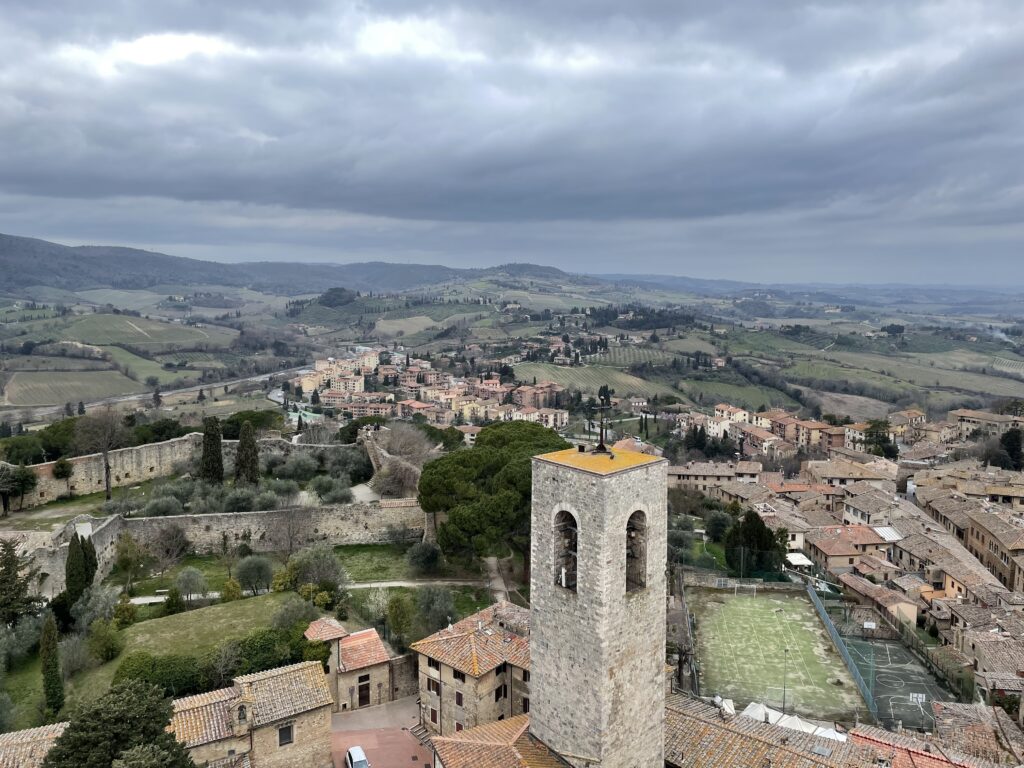
☀️ Average Temperature: 59/42 °F | ☔ Average Rainfall: 3 inches
March is a great time of year to visit Tuscany. With mild weather (daytime highs are typically around 60F) this is a great time of year to be outside and explore Tuscany to take advantage of everything there is to see and do in this beautiful region of Italy.
Tuscany’s capital city, Florence, is home to world famous Renaissance art and architecture. Its compact size makes it a great choice for families with young children, but it also offers great food and scenic views (the best views of the city are from Piazzale Michelangelo) that will enchant adults as well.
As fantastic as Florence is, don’t overlook the Tuscan countryside, with its scenic rolling hills and great wine. You can rent a car for a day to check out charming little towns like Siena, Lucca and Voltera, or stay at an agriturisomo (a working farm that welcomes tourists) to get a taste of local life.
Top Things To Do: Wine tasting in Chianti, Visit the Uffizi Gallery in Florence
Where to Stay: Castello Banfi Il Borgo
Recommended by Adrienne of Destinations and Desserts
Malta
9. Valleta
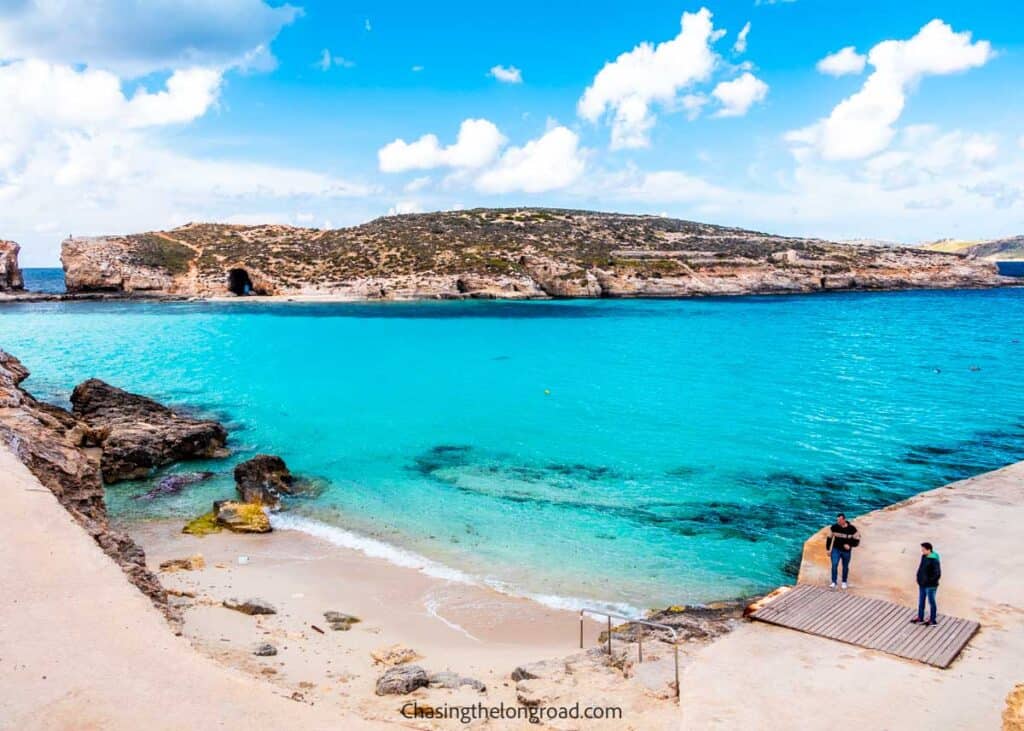
☀️ Average Temperature: 63/51 °F | ☔ Average Rainfall: 2 inches
If you want to escape the cold and wet weather in March, plan your next holiday to Malta. It is a tiny island country in the Mediterranean Sea, renowned for its pristine beaches, dramatic coastline, warm climate and historic towns. There are plenty of wonderful things to do in Malta for a perfect winter gateway.
During this time, the weather is much warmer than the rest of the European countries, with sunny days and mostly clear blue skies.
Malta’s capital city, Valletta, is a UNESCO World Heritage site and a fascinating place to explore. St John’s Co-Cathedral is a must-visit attraction in the city. Founded in the 16th century, the incredibly ornate interior of the cathedral is one of the best examples of Baroque architecture in Europe.
Also, admire the breathtaking panoramic view of the picturesque Grand Harbour and the Three Cities from the Upper Barrakka Gardens.
Take a day trip to explore the atmospheric walled city of Mdina, known as the silent city and the neighbouring historic town of Rabat.
For a beach day, head towards Blue Lagoon on Comino Island or the Golden Sand Bay on the mainland. While the water in winter is a bit cold for water sports, you can take a hike around the island. The scenery is simply breathtaking.
Top Things To Do: Visit the historic capital Valletta, Explore the Mdina old city
Where to Stay: The Xara Palace Relais & Chateaux
Recommended by Moumita from Chasing the Long Road
Montenegro
10. Kotor
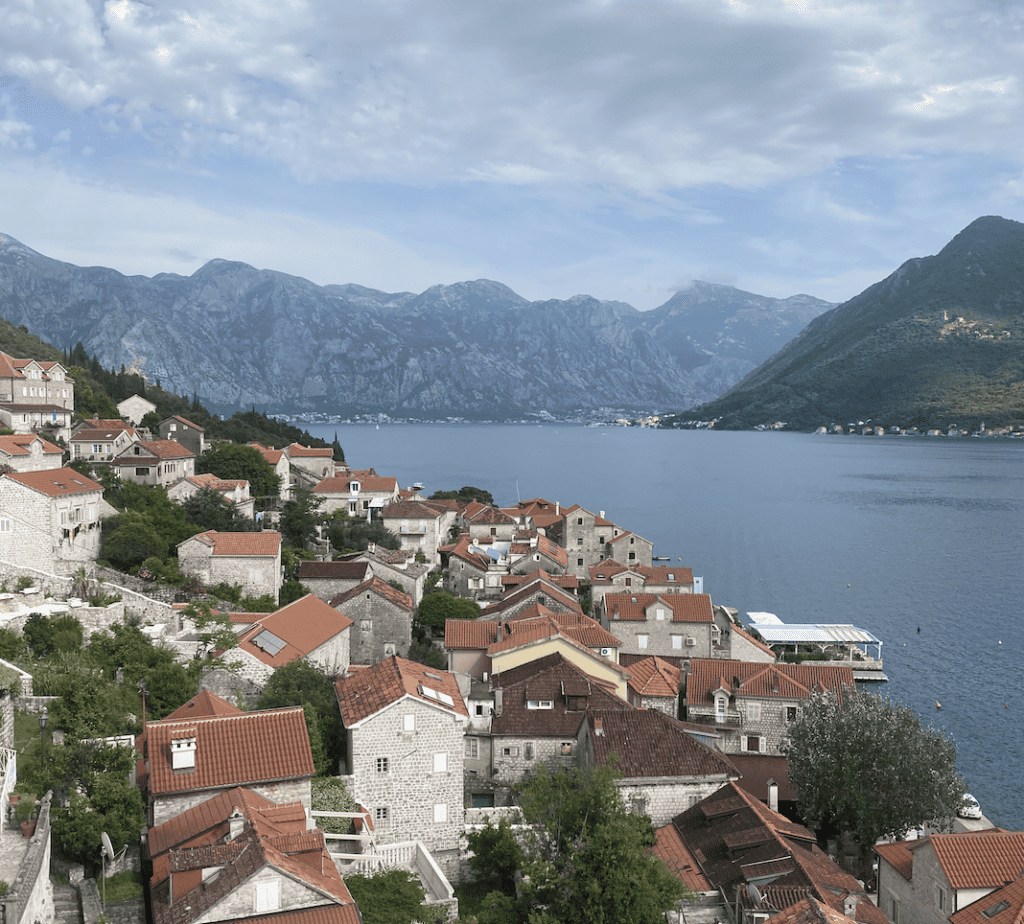
☀️ Average Temperature: 59/45 °F | ☔ Average Rainfall: 7 inches
Nestled along the picturesque Adriatic Coast, Kotor is a gem of a destination to visit in March. This charming town, located in Montenegro, boasts a rich history, stunning landscapes, and a unique blend of culture and adventure, making it an ideal vacation spot.
March is a great time to explore Kotor thanks to its pleasant climate with temperatures of up to 64°F, making it comfortable for outdoor activities.
You’ll also find fewer crowds, allowing you to enjoy the main attractions free from the cruise ship tourists.
Discover Kotor’s Old Town, a UNESCO World Heritage site – it’s a labyrinth of cobblestone streets lined with medieval architecture. The dramatic mountains in the backdrop add to Kotor’s allure, creating a postcard-perfect setting.
Enjoy delicious Mediterranean cuisine, explore historic landmarks, and experience the warmth of the welcoming locals.
My favorite thing to do is to hike the city walls for breathtaking panoramic views of Kotor Bay and the surrounding mountains.
Top Things To Do: Explore the Bay of Kotor, Visit the Kotor Old Town
Where to Stay: Forza Terra Hotel
Recommended by Laura of What Laura Did Next
Portugal
11. Algarve
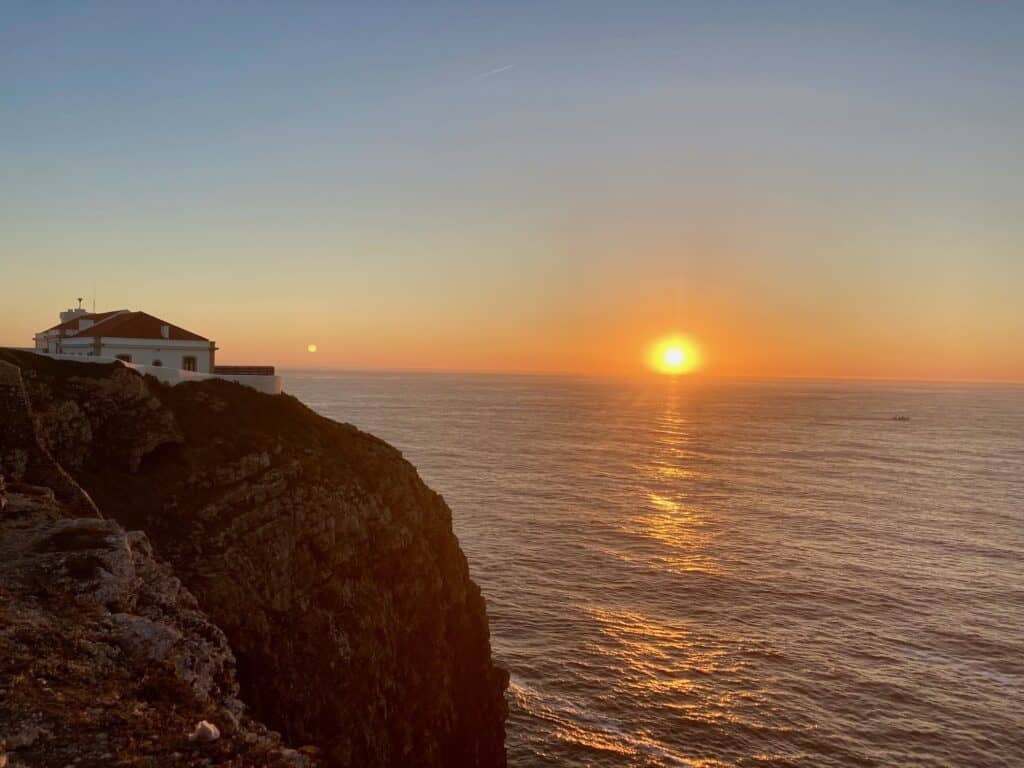
☀️ Average Temperature: 63/52 °F | ☔ Average Rainfall: 2 inches
The Algarve is a perfect place to visit for some Springtime sun in March. In March temperatures are a comfortable 18°C to 25°C, the only downside is that it can be a bit wet. However, it’s a lot less crowded than in the summer months which makes up for a bit of rain!
We love to hike, and there are lots of coastal paths to try, especially in the milder weather. Our favourite is the 7 Valley Hanging Trail. If you stop part way along the trail at Benagil Beach you can take a kayak or boat ride out the Bengali Caves.
There are lots of wonderful beaches to explore in The Algarve which will be less busy in March. Why not enjoy a quiet sunset at stunning Sagres lighthouse, the most western point. Or enjoy fresh seafood at Burgau Beach, one of our favourite year round beaches.
If you’re a golfer then a must do activity is to play a round or two.
The downside to visiting with kids in March is that the water parks don’t reopen until mid-March. However, there’s a great zoo at Lagos, go-karting in Albufeira and lots of crazy golf to keep them entertained. As well as, of course, plenty of boat tours to explore.
Top Things To Do: Enjoy the beaches, Explore the Ria Formosa lagoon
Where to Stay: Pine Cliffs Resort
Recommended by Sara from Big Adventures with Little Feet
12. Madeira

☀️ Average Temperature: 66/58 °F | ☔ Average Rainfall: 3 inches
Madeira, a captivating Portuguese archipelago in the Atlantic, beckons as an ideal vacation destination for diverse reasons.
Renowned for its stunning landscapes, Madeira offers a perfect blend of lush greenery, rugged mountains, exciting hikes, quaint towns and unusual beaches. The archipelago boasts a mild climate year-round, making it an appealing getaway.
In March, the weather is pleasantly mild, with temperatures ranging from 15-20°C, although it can be a bit windy. Flowers are starting to bud although the annual Flower Festival, showcasing vibrant blooms, doesn’t happen until May.
Travelers should be prepared for varying weather conditions. Nevertheless, March allows for fewer crowds than the summer, making it an excellent time for a tranquil escape.
Madeira is not an expensive location to visit and there are plenty of free activities to do such as the skywalk, the botanical garden, beachside strolls, catching cable cars and enjoying the local cuisine alfresco (all year round) which contribute to Madeira’s charm, ensuring a delightful holiday experience.
Top Things To Do: Visit the Laurisilva forest, Enjoy the Funchal Cable Car
Where to Stay: Belmond Reid’s Palace
Recommended by Emma from Journey of a Nomadic Family
Spain
13. Frigiliana
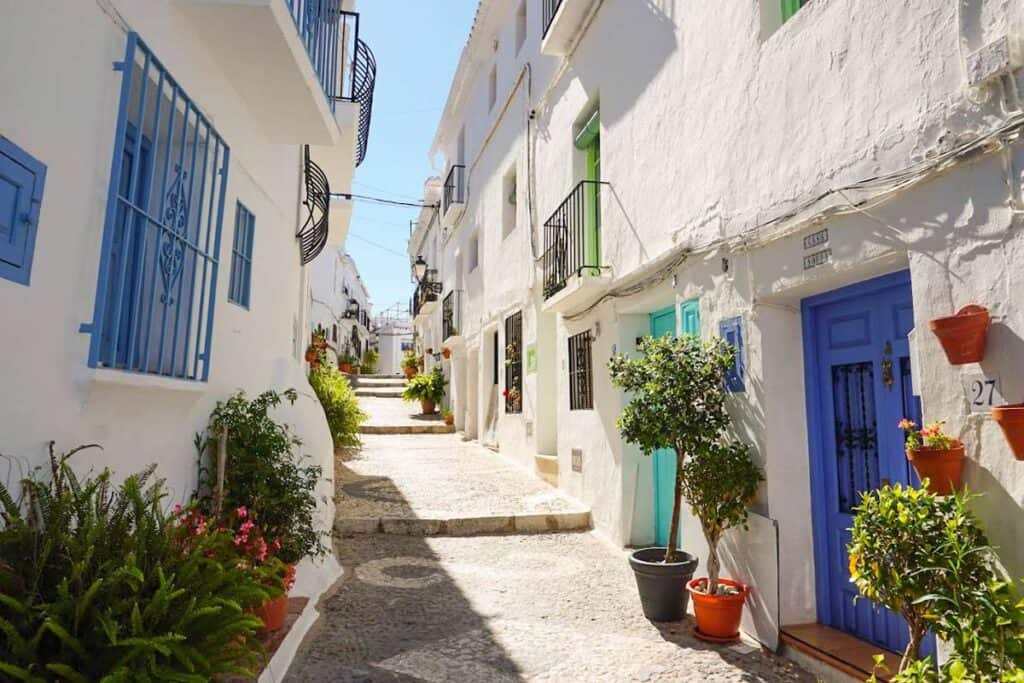
☀️ Average Temperature: 68/48 °F | ☔ Average Rainfall: 2 inches
Frigiliana is nestled in the foothills of the Sierras de Tejeda mountains, in the beautiful Axarquia region of southern Spain, just 15 kilometres from the Mediterranean Sea.
It’s considered one of the most beautiful villages in Spain and is a gloriously typical white-washed village, steeped in Andalusian charm.
March is the perfect time to visit. Almond blossom and bougainvillea compete with spring blooms. The air maybe cool but the sky is blue and the sun so warm. You’ll need sunscreen during the day and a jacket after sunset. April showers have yet to fall and with an average of 9mm of rain in March, you’ll enjoy mostly dry days.
School holiday visitors have left and Easter visitors not yet arrived so prices may be cheaper; certainly flights to Malaga less expensive.
Most folks explore the maze of traditional narrow streets and Moorish houses with their brightly painted doors, often home to boutiques or galleries. We love to hike and there are many trails to discover in the mountains and along the coast.
There are daily buses to and from Frigiliana and the Mediterranean beaches of Nerja and to the region’s capital of Malaga.
The only possible downsides are that shops and restaurants tend to close earlier when the day trippers leave but there are still plenty of choices for a leisurely Spanish lunch.
And if you like to swim, the village pool doesn’t open until later in the year, although private pools are open. And the sea might be too cool for some, but I’ve taken a dip in January!
The sun shines year-round in Frigiliana but March is a very special time in this little corner of Spain.
Top Things To Do: Explore the Old Moorish quarter, Visit the historic Frigiliana village
Where to Stay: Hotel La Viñ
Recommended by Colleen of Then We Walked
14. Granada
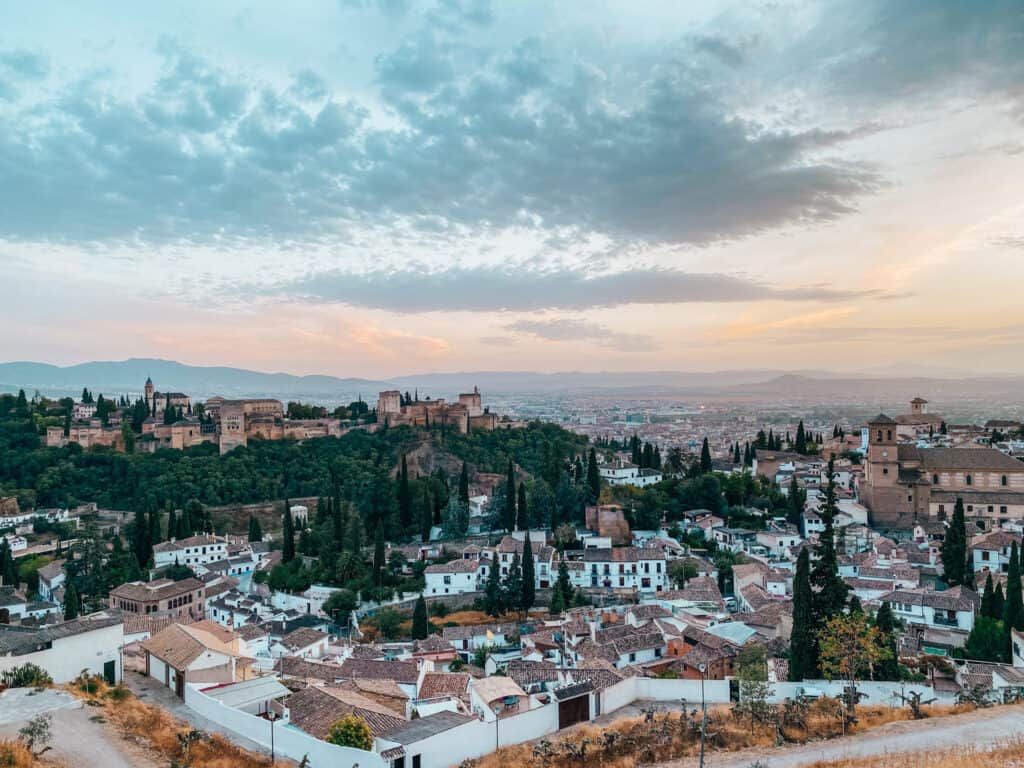
☀️ Average Temperature: 68/45 °F | ☔ Average Rainfall: 2 inches
Granada is one of the best places to visit in Europe in March if you’re looking for sun and culture.
The city in Southern Spain is mainly known for the famous Alhambra Palace. This Moorish castle can get very overcrowded in the summer months, so March is a great time to visit to get those Insta-worthy pictures without the crowds.
One slight downside of visiting in March is that some of the flowers, especially in the Alhambra’s famous gardens, might not be in full bloom yet.
However, Granada offers much more than just the Alhambra, including vibrant markets, tea houses, an impressive cathedral, and unique cave houses. The best way to experience the unique cave houses in Granada is to watch a flamenco show inside one of these cave houses. This experience combines two amazing Granada activities: visiting a cave house and watching a flamenco show.
Overall, Granada is the best place to experience the vibrant culture and history of Spain. Visiting in March lets you enjoy this charming city without the crowds.
Top Things To Do: Visit the Alhambra, Explore the Generalife gardens
Where to Stay: Palacio de Santa Ines
Recommended by Tina from Veganderlust
15. Marbella
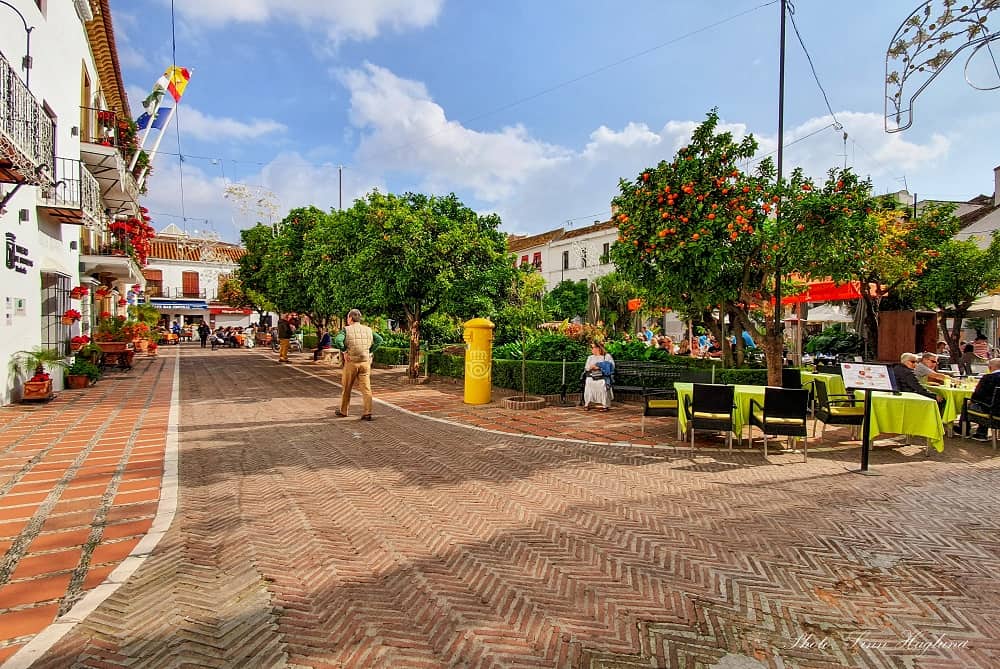
☀️ Average Temperature: 68/50 °F | ☔ Average Rainfall: 2 inches
March is a fantastic month to visit Marbella in southern Spain. Not only is it before the tourist season fully starts, making sightseeing more comfortable, but the temperatures are starting to feel like spring.
And when we talk about southern Spain, spring can even feel like summer in northern parts of Europe.
With temperatures rising above 20 degrees, it is nice to go for walks on the marina of Puerto Banus, grab a cold drink in the sun, or stroll along the beach. You might even want to take a dip on a hot day.
When Easter Week falls in March, you can expect large religious processions through the streets with floats depicting happenings from the bible on the days leading up to Jesus’ crucifixion, sad music, and the scent of incense filling the air.
When considering where to stay in Marbella, the area around the old town is great for sightseeing, but if you want to party or mingle with the rich and famous, Puerto Banus and the Golden Mile are the places to stay.
Top Things To Do: Relax on the Costa del Sol beaches, Explore the Old Town
Where to Stay: Marbella Club Hotel
Recommended by Linn of Amused by Andalucia
16. Menorca
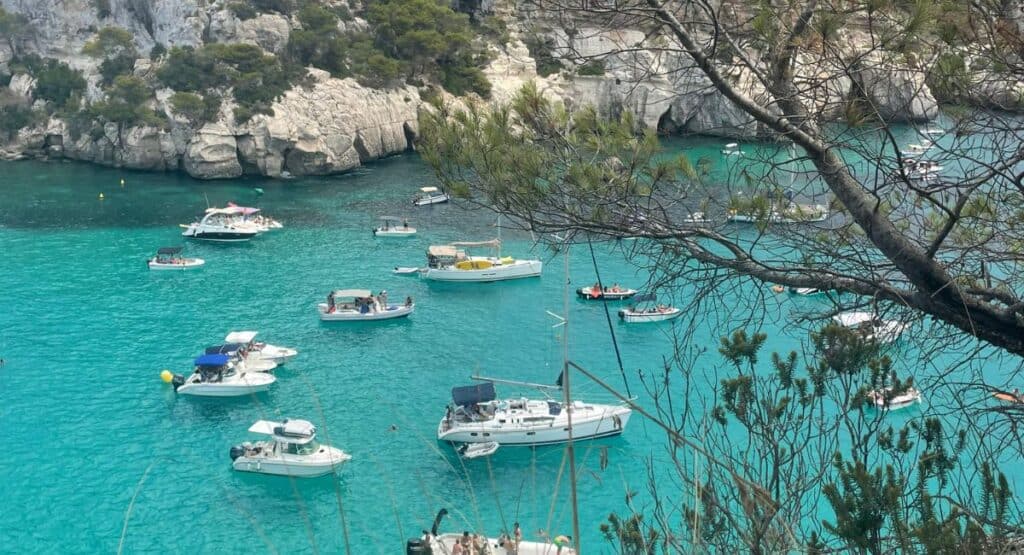
☀️ Average Temperature: 63/50 °F | ☔ Average Rainfall: 2 inches
In March, visiting Menorca is a quieter, but still warm, alternative to its sister island, Majorca. It’s a perfect time to explore the beaches and bays like Cala in Turqueta and Cala Mitjana – each one spectacularly picturesque with clear, bright blue waters.
The coastline is filled with sailboats, yachts, and boat tours – a picture perfect view! Much of the island is protected as a nature preserve, so there are endless trails to explore, like the Camí de Cavalls.
The charming fishing village of Binibeca, known for its whitewashed walls and rich history, is another must visit while you’re here.
Although March is warm with average temperatures of 60°F/15°C, swimming might be a bit chilly, but you’ll stay comfortable throughout your trip.
Menorca is perfect for sailing, hiking, and embracing the outdoors, a chance for you to fully appreciate its natural beauty.
And of course, being a Spanish island just off the coast of Barcelona, you can’t miss out on the incredible food. You’ll find Mahón cheese and freshly caught fish dishes in most restaurants on the island.
Top Things To Do: Visit Ciutadella, Explore the Camí de Cavalls trail
Where to Stay: Hotel Rural Sant Ignasi
Recommended by Rachel from Barcelona Uncovered
17. Sevilla
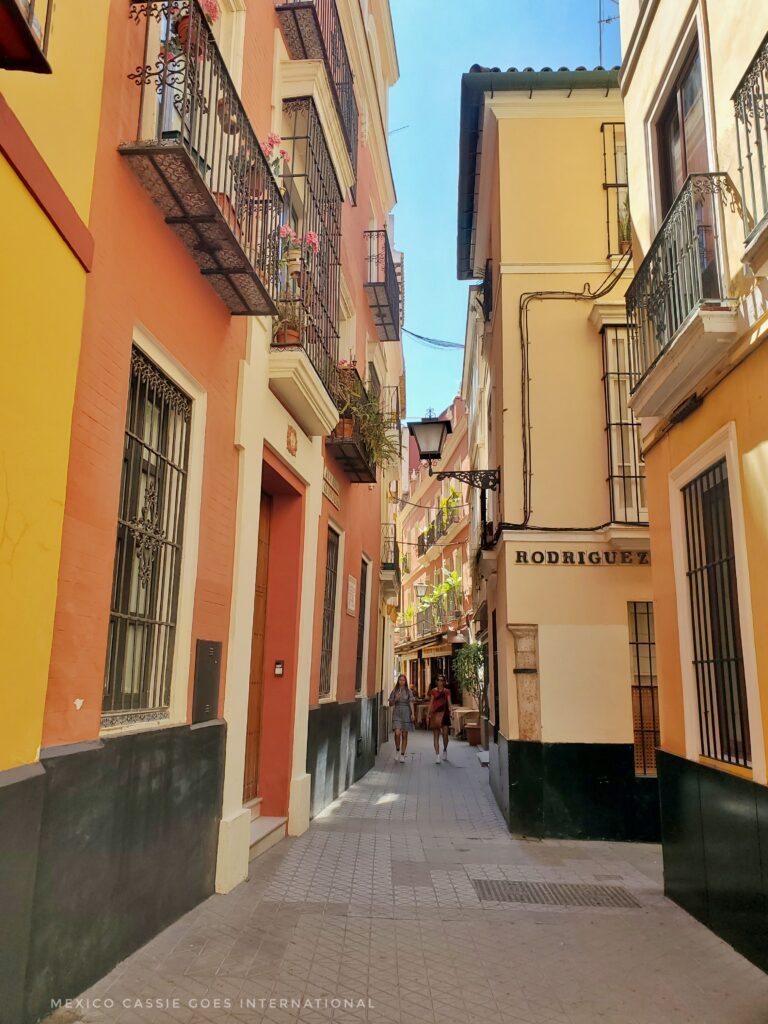
☀️ Average Temperature: 70/48 °F | ☔ Average Rainfall: 3 inches
March is the perfect month to visit Sevilla in Andalucía, Spain. The weather is just about perfect at this time of year and the orange trees will be blooming all around you everywhere, filling the air with their sweet scent.
While in Sevilla, of course you must visit the famous Alcazar, the royal palace, and the cathedral. Together, these historical sites (along with the India Archives) constitute the Sevilla UNESCO World Heritage Site.
Visitors to Sevilla must not miss the gorgeous Plaza de España, strolling through the narrow streets of the old Jewish quarter or visiting Las Setas at night for gorgeous views of the city.
In 2024, Semana Santa (Holy Week) is at the end of March so if you enjoy processions and general street revelry, you’ll love this.
Grab a pair of comfortable shoes (you’ll be walking a lot), a thin jacket or sweater and get your stomach ready for all those excellent tapas you’ll be enjoying on your trip to Sevilla.
Top Things To Do: Explore the Real Alcázar, Visit the Seville Cathedral
Where to Stay: Hotel Alfonso XIII
Recommended by Cassie from Mexico Cassie
18. Valencia
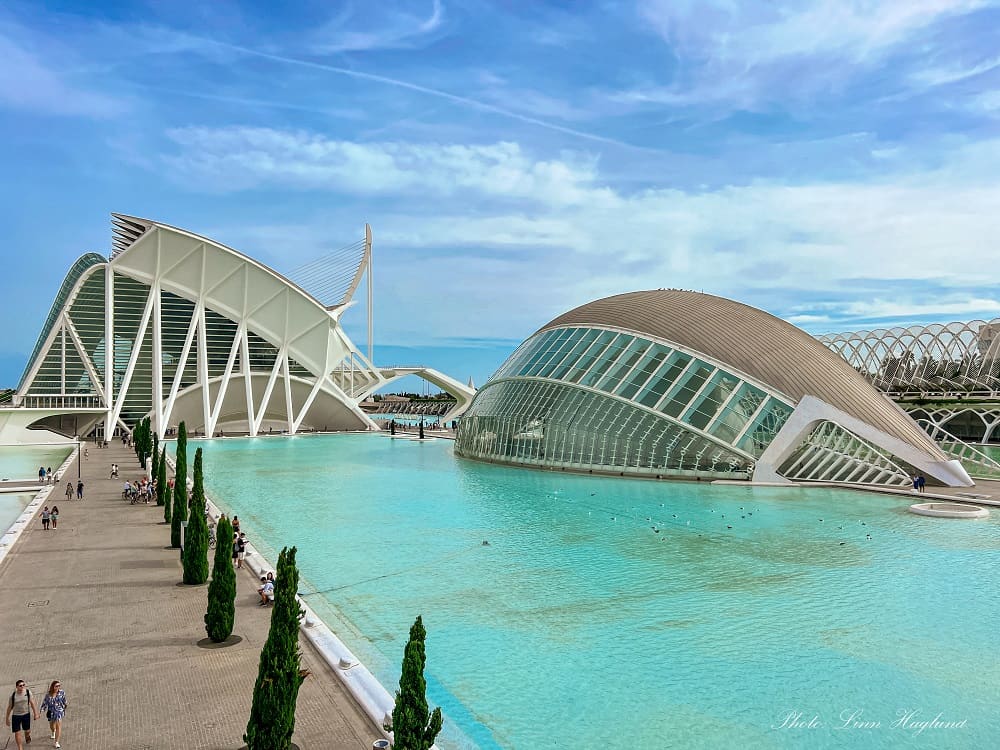
☀️ Average Temperature: 68/48 °F | ☔ Average Rainfall: 1 inch
Valencia is an amazing March destination as you will be able to experience the Fallas Festival which ends on the 19th of March. It is a colorful fiesta with music, figures all across the city, and fireworks at night.
The weather is usually nice and warm already with average highs of 19 degrees Celsius, but often even warmer.
It is perfect for sightseeing too, whether you decide to bike to the City of Arts and Sciences or walk around the old town exploring the architecture, the cathedral, and art galleries.
March in Valencia offers a wonderful spring vibe and there are plenty of cafes and bars where you can sit outside enjoying a drink in the sun.
When considering where to stay in Valencia, it is best to stay close to the old town as the beach will likely be too cold for swimming. From there, you can reach all the main attractions by foot, but you can also take the bus or tram to get around if you prefer.
Top Things To Do: Visit the City of Arts and Sciences, Explore the old town and the Central Market
Where to Stay: Caro Hotel
Recommended by Lin of Brainy Backpackers
What to Wear in europe in March (for warm weather)

When packing for warm weather destinations in Europe in March, it’s important to balance comfort with adaptability. It’s also important to pack items that can be layered as temperatures can vary each day.
The key is to opt for light and breathable fabrics like cotton or linen to stay cool during warmer days. Include versatile items such as short-sleeved shirts, blouses, and comfortable shorts or skirts.
However, evenings can still be a bit chilly, so don’t forget a lightweight jacket or a cozy sweater.
Comfortable walking shoes are a must for exploring, and a pair of sandals for warmer days is also a good idea. Sunglasses, a wide-brimmed hat, and sunscreen are essential to protect against the sun.
Remember, layering is your friend in this transitional weather, allowing you to adjust easily as temperatures change throughout the day.
Map of Where to Travel in Europe in March
Final Thoughts: Which country in Europe is best to visit in March?
Overall, it can be challenging to find super warm weather in Europe in March. If you’re hoping for swimming or tanning weather, there will have to be a bit of luck involved.
However, if you’re craving warm weather in the 70’s for exploring and sightseeing, there are many great options. Spain has the most warm trip options ranging from exploring exploring history in Sevilla to hiking in Menorca.
Before You Go…
If you’re planning a trip to Europe for shoulder season, I encourage you to consider visiting Europe in November. There are great warm and cold weather destinations, and good off-season prices.
Related Posts:
- Best European Countries to Visit in November: 28 Trip Ideas
- Europe Trip Itinerary: Planning The Perfect 3 Weeks In Europe
- Balkans Road Trip 10 Day Itinerary & Travel Guide
- 30 Best Countries to Travel in June: Fun Summer Trip Ideas
- 21 Best Places to Travel in Europe in September 2024
Pin for Later:


